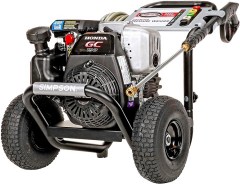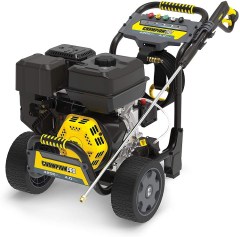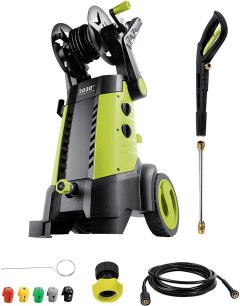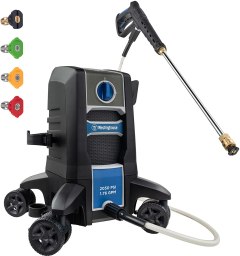Buying guide for Best pressure washers
When you need a thorough outdoor cleaning, such as your driveway or siding, nothing executes the task as effectively and efficiently as a pressure washer. A pressure washer is a powerful surface cleaner that can remove mud, algae, gum, loose paint, mold, mildew, and more. There are a number of models available, and certain cleaning jobs are better served by some models than others. For instance, some might be great for your patio but won't reach the second floor. How do you decide which is the best power washer for you?
If you need power, go for a gas pressure washer. Electrically powered models are lighter but don't pack the same wallop. Most homeowners can get by with 2,000 to 3,200 psi, but needs vary so choose what's right for you. It is also important to consider the weight – if you can't easily move the unit about, cleaning will be difficult.
Key considerations
First, let's examine the two main types of pressure washers, along with their pros and cons. Although both are types of power equipment, one may be more suited to your needs than the other.
Electric pressure washers
As the name implies, electric pressure washers are powered by electricity, using a cord plugged into a power outlet.
Pros:
-
These products tend to be more lightweight and easier to carry around than gas versions.
-
Since you don't need to fill them with fuel, you avoid the mess of refueling and the hassle of storing cans of gas.
-
The lower pressure means they're well-suited to more delicate jobs, such as washing cars, mowers, and outdoor furniture.
-
These washers are generally more affordable than their gas-fed counterparts.
Cons:
-
With lower pressure, electric models aren't as good at tackling tougher jobs.
-
Even with the best electric pressure washer you can get, you are limited as to where you can take it, as with corded versions, you need to stay within reach of a power outlet. That said, it may be possible to augment your reach with an extension cord. Another possibility is a cordless washer. Notably, a cordless washer may not have as much power as a corded model. In other words, it may be better for cleaning the exterior of your car than removing oil and stubborn grime from your driveway or home siding.
Gas pressure washers
Gas pressure washers have a motor powered by gasoline, which means you need to manually refuel the tank when it runs out. If you do not already own a gas can, you will need to go out and get one.
Pros:
-
These machines tend to be more powerful.
-
The highest-power models can be used for tasks that their electric counterparts couldn't easily tackle, such as stripping paint.
-
You're not constrained by a power cord, so you can take this machine practically anywhere.
Cons:
-
These washers tend to be heavier than their electric counterparts.
-
You have to refuel them when they run out of gas, which can be messy.
-
As a rule, these models cost more than electrically powered versions.
In our research, we examine the two main types of pressure washers: electric and gas. If you’re only going to be doing light tasks, it’s best to go with an electric pressure washer. Gas models are much more powerful.
We find out how to adjust the spray of each pressure washer we review. Some have a nozzle you simply turn to adjust. Others have different nozzle tips you can use as desired.
We look at a pressure washer’s spray power by noting its air pressure, measured in pounds per square inch, or PSI. The higher the PSI, the more powerful the pressure washer. PSI ranges from 1,000 to 4,500.
We distinguish between residential-grade and commercial-grade pressure washers in our research. Most of our readers have residential purposes in mind, but some prefer a commercial-grade machine for tasks like stripping paint.
Because ergonomics affect ease of use, we consider how comfortable the handle or grip of a pressure washer is.
When researching gas pressure washers, we find out how easy they are to refuel and how messy the overall process is.
When researching pressure washers, we note whether a hose is included. Bonus points go to washers with a hose, as this allows you to use the machine straight out of the box.
Pressure washers may be made of plastic or steel. We often give preference to steel models, as they are less prone to leaks and breaks.
Some pressure washers have a built-in detergent tank that you simply switch on when you want to use soap. When this feature is offered, we note it in our research.
Because the weight of a pressure washer may affect its ease of use for some people, we note this figure in our research. Electric pressure washers tend to weigh between 20 and 45 pounds, whereas gas pressure washers usually sit between 55 and 90 pounds.
Features
Pressure
Pounds per square inch (psi) is a unit used to measure how powerful a pressure washer is. As a rule, the higher the psi, the more powerful the pressure washer is, though other factors are at play (more on that later).
Bear in mind that a pressure washer is not quite the same item as a power washer. While both use an impressive water spray and offer significant cleaning power, a power washer uses heated water, whereas a pressure washer uses cold water.
For most homeowners, a pressure washer will suffice. In fact, the high heat of a power washer may be damaging to some surfaces found in the typical home, making a pressure washer the better choice. However, if you want to remove stubborn stuck-on debris from a hardy commercial parking lot or patio, the high heat of a power washer may better serve you.
Electric vs. residential vs. commercial
Electric: These machines operate via an electric motor and tend to have a psi between 1,000 and 2,000 – suitable for washing cars, outdoor grills, plastic play sets, garden furniture, driveways, and patio furniture.
Residential: Residential-grade gas engine washers tend to offer between 2,000 and 3,200 psi, suitable for washing boats, cars (on lower pressure nozzle settings), decks, patios, house siding, and fencing.
Commercial: Commercial-grade gas pressure washers tend to have a psi between 3,200 and 4,500, or sometimes higher. These are suitable for paint stripping, surface preparation, construction site or heavy-duty cleaning, and graffiti removal.
If you only have light-duty tasks in mind for your pressure washer, use an electric model – gas versions may be overkill.
STAFF
BestReviews
Cleaning units
While psi is a good indicator of how powerful a pressure washer is, it's also worth looking at the cleaning units (CU). This rating takes into account the volume of water a unit puts out, as well as the pressure. Suppose you had two pressure washers of equal psi. If one pumps out a higher water flow (check the GPM rating to find this out) per minute than the other, it will naturally offer you more cleaning power.
A basic consumer model might have a CU rating of 2,000 to 8,000, whereas a more powerful model with a gas engine may have a CU rating between 8,000 and 16,000.
Commercial models can have CU ratings up to 30,000 – but that's way too much for the average homeowner.
Weight
Think about the weight of your chosen pressure washer. Will you easily be able to move it around your house or property?
Electric pressure washers are relatively light, weighing roughly 20 to 45 pounds. Gas pressure washers, on the other hand, are heavier – an average model weighs anywhere between 55 and 90 pounds.
Adjustable spray
All pressure washers are capable of adjusting their spray. A smaller, more concentrated spray has higher pressure and is good for extremely tough jobs, while a wider-angled spray has lower pressure and is best for lighter or more delicate jobs.
The method of setting the spray varies. Some pressure washers have an adjustable nozzle that you turn to get different dispersion angles. Other models have interchangeable nozzle tips that you switch out depending on the desired angle of spray. You can also buy universal pressure washer attachments if you need more nozzles than what your machine comes with.
Handling
How important is it that your pressure washer is easy to move around?
Lighter electric models usually strap to your back like a rucksack, whereas heavier gas models tend to have wheels so you can drag or push them along.
If you'll use your pressure washer over rough terrain, you might prefer to have a model you can carry, or one with large, air-filled tires that will maneuver better over bumps.
Did you know?
Pressure washers either have an adjustable nozzle or a set of nozzle tips to change the angle of spray. Both options give the same result, so choose whichever seems most convenient to you.
STAFF
BestReviews
How to use a pressure washer
Before you begin pressure washing, clear the area you wish to clean of unnecessary items, including patio furniture you don’t intend to wash, potted plants, kids’ outdoor toys, and similar.
Put the appropriate nozzle on your pressure washer for whatever job you are about to do. The nozzles should be color-coded according to how much pressure they exude. For example, black nozzles are for lighter-duty jobs like cleaning a car. Green nozzles are for medium-duty jobs like cleaning driveway pavement that does not have heavy oil stains. If you have oil stains on your driveway, however, a red nozzle is the better choice because it is designed to lift stubborn stains and grime.
You don’t need a specialized “high-pressure hose” to operate your machinery. Instead, simply connect a garden hose to your washer and your home’s water source. If your garden hose is stored on a hose reel, you should completely unravel it first.
Release excess air by squeezing the trigger for 60 seconds or so. Begin by stepping 3 feet back from the item you are cleaning applying pressure at the lowest level possible. Work your way up as needed.
After pressure washing, there may be other tasks you need to complete. Soap may need to be rinsed from some items using a hose. Some decks may need to be resealed (or sealed for the first time) after a cleaning. And if you’re planning to paint the surface you just cleaned, allow it to completely dry before beginning that project.
Project ideas
Once you get your new pressure washer, you may be wondering what you can do with it. These versatile machines can be used to clean a number of items around the home — including the house itself. Here is a list of ideas to get you started.
You can use your new machine to clean:
- The exterior walls of your home
- The exterior walls of your garage or storage shed
- The fence around your yard’s perimeter
- Your deck and wooden porch
- The concrete, stone, or tile of your patio
- The floor of your garage
- Your driveway
- Dirty outdoor gear: bikes, grills, patio furniture
- Your riding lawn mower
- Your vehicles, trailer, or boat
Of course, you should study your owner’s manual first to make sure you know how much water pressure is appropriate for the item or items you are cleaning!
Tips
-
It's best to use the widest angled nozzle that will adequately achieve the task in hand. Use too narrow a spray and you might cut into the surface you're trying to clean.
-
If you have a gas-operated machine, don't forget the engine will need occasional servicing. Your owner’s manual should provide a recommended maintenance schedule.
-
Before you turn on the washer, pre-treat stubborn areas. For example, you might want to use a scrub brush on vinyl siding with caked-on dirt. Pre-rinsing with a hose can also help loosen up dirt for a more effective clean.
-
Never use a pressure washer while on a ladder. The recoil can cause you to lose balance and fall.
-
When cleaning a vertical surface like a wall, you will get the best results by cleaning from the bottom up. Once you have cleaned the entire surface, rinse it from the top downward.
-
Aim your running washer away from people, pets, electrical wires, and electrical sockets. You can cover electrical sockets with duct tape to avoid an inadvertent accident.
-
Note that some things should simply not be pressure-washed. This includes windows, items covered with lead paint, asphalt shingles, and crumbling/weakening mortar. Understand the instructions completely before operating your washer.
Pre-soaking the surface you want to clean with your pressure washer (with detergent, chemical pre-soak, or degreaser) reduces the amount of time you will otherwise need for the washing.
STAFF
BestReviews
Price
You can find pressure washers to suit a range of budgets, and the average home user needn't spend a fortune to get the cleaning power and durability they seek.
Electric
Pressure washers that run on electricity start at around $75 and can cost up to $250. You can find a model powerful enough for the average home user with a $150 price tag.
Gas
Pressure washers powered by gas start at $200 for basic home models, and they can cost more than $2,000 for commercial models. Even for heavy-duty home use, you shouldn't need to pay more than $500, but you'll find some great options closer to the $300 mark.
FAQ
Q. Are pressure washers safe to use?
A. Pressure washers are safe to use as long as you exercise common sense and caution, but the extreme pressure of the water flow could cause an injury, so never point the spray toward someone. It's also wise to wear safety glasses and long pants while using your pressure washer.
Q. Can you use a pressure washer to wash a car?
A. You can, but you need to be cautious not to use too high a psi. Our expert, Luke, says, "Are you thinking about using your pressure washer to clean your car? An electric pressure washer’s psi could be more suitable for the task. Use caution when applying pressure washer water to your car’s delicate paint."
Notably, many people use a pressure washer to clean their riding lawn mowers. Because these tractors pick up a lot of dirt and debris on the job, a pressure washer is an effective way to erase much of the mess.
Q. Do pressure washers with a higher psi give better results?
A. The most powerful pressure washers, those with higher psi and CU ratings, don't necessarily give better results, but they do give faster results. An 8,000 psi pressure washer can usually achieve the same results as a 16,000 psi pressure washer, but it will take roughly twice as long to do so.
Q. What is the difference between psi and GPM?
A. Whereas psi stands for “pounds per square inch” and reflects the intensity of the pressure, GPM reflects the per-minute volume of water (flow rate) that moves through the nozzle. Both figures can help you determine the effectiveness of a given product.
























































